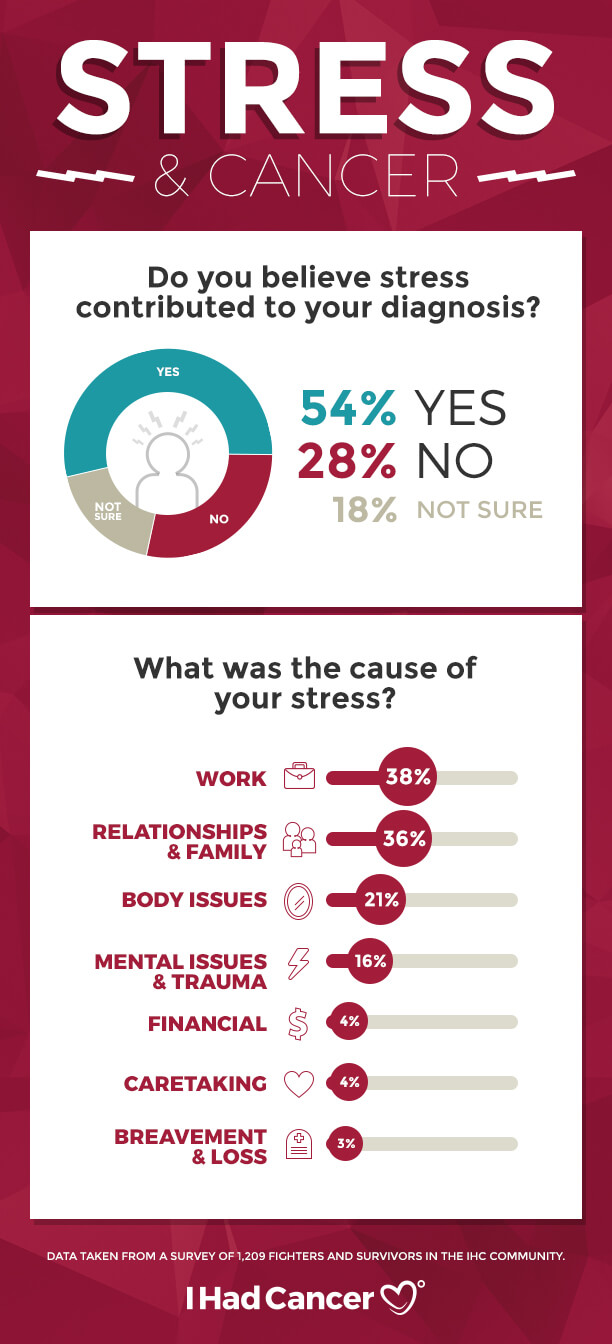6 Things You Need to Know About Stress and Cancer
We asked and you told us. There are so many factors that contribute to a cancer diagnosis, but an overwhelming amount of people in our community agree: stress has contributed to their diagnoses.
In a recent survey we conducted, 54% of respondents said that stress has contributed to their cancer diagnosis. 28% said it did not, and 18% were not sure. (Scroll down or click here to view the rest of the data.)
As soon as we saw that more than half of the participants answered “Yes,” we knew there was more to be uncovered. Your honest responses showed us that this is a conversation that needs to be had so we hosted the first-ever #StressAndCancer tweetchat. The conversation was awesome and confirmed the need for this discussion. It was verification that stress plays a big role in the cancer journey, not only before the diagnosis, but especially during and after.
We know not everyone is on twitter or able to participate, so we compiled some of the top moments into this blog post, along with some resources to help manage stress. Our hope is that we can continue these conversations, and figure out how to handle stress, together.
1. Everyone has a different story of how stress did (or did not) contribute to their cancer diagnoses.
@ihadcancer For me, I know the cause was genetic (Lynch syndrome) so I don't think stress contributed to dx - it came afterwards! #stressandcancer
— writer sam (@writersamr) April 26, 2017
@ihadcancer I don't think it contributed to my initial diagnosis, but I often worry it may be a factor for recurrence.
— brittneymemphis (@brittneymemphis) April 26, 2017
A1 For me, cancer was thought to be related to immunosuppression, but stress management played a big role in my recovery #stressandcancer
— Jessica Melore (@jessicamelore) April 26, 2017
2. Work is a huge cause of stress, but there are ways to keep it under control.
Work was my # 1 stress. I had to keep working to keep my insurance. Worked when hospitalized & during infusions. #stressandcancer https://t.co/MGVpK1Hz02
— Christopher Jenkins (@hopecarebe) April 26, 2017
A3: Short breaks to walk outside, listen to music, etc can help w/ stress @ work. More tips here https://t.co/4MpkqcQVST #stressandcancer https://t.co/hAqCpWTzyU
— Cancer and Careers (@CancerAndCareer) April 26, 2017
Q3: I think setting expectations is a big thing-if you have a particular chemo schedule, organizing your work ahead of time #stressandcancer
— Jessica Melore (@jessicamelore) April 26, 2017
3. Stress has a real impact on families and relationships.
@ihadcancer At one point I had to have a family member make all the calls because booking appointments was too stressful for me.
— Danielle Nicosia (@ThycaSurvivor09) April 26, 2017
A4. Yes. It impacted household finances, child care & daily routine. All of which affected relationships & family. #stressandcancer
— Tinu Abayomi-Paul (@Tinu) April 26, 2017
4. After you're diagnosed, stress levels, not to mention what stress looks like, are different.
@ihadcancer I was living a fairly stress free and happy life. Suddenly I had so many things to worry about. So many appointments. #cancerandstress
— Renée (@rshill37) April 26, 2017
Yes and it made it very difficult to listen about other people's trivial stresses #stressandcancer https://t.co/eLGCtnGOiC
— Christopher Jenkins (@hopecarebe) April 26, 2017
@ihadcancer A6. A huge one. No one tells you that you may wait months to start treatment while you're aware of your body's mutiny. #stressandcancer
— Tinu Abayomi-Paul (@Tinu) April 26, 2017
5. Even when treatment ends, stress doesn't.
@ihadcancer After treatment and surviving, some stress went away. Recurrence is always on my mind. I'm reminded every day when I take my medication.
— brittneymemphis(@brittneymemphis) April 26, 2017
@ihadcancer Dealing with the #scanxiety every fews months and wondering if IT came back is what stressed me out for the longest time. #stressandcancer
— Heather Von St James (@HeatherVSJ) April 26, 2017
A8 When life "normalized" I got out of my 'fight/flight" mode & stressed about things i didn't think about before #stressandcancer
— Jessica Melore (@jessicamelore) April 26, 2017
6. There are things within your control that can help relieve stress.
@ihadcancer Music, writing and connecting with others that get it help me cope. Especially volunteering my time to those that are newly diagnosed.
— Danielle Nicosia (@ThycaSurvivor09) April 26, 2017
Q9 And finding those people who understand or who listen and aren't dismissive. They are few but they are wonderful humans. #stressandcancer
— writer sam (@writersamr) April 26, 2017
Let's keep the conversation going- because stress is a monster that feeds on stress. It can build and build and build, so if you are dealing with stress and cancer, talk about it and be honest. Remember: you are NOT alone.
Click the image below to enlarge the infographic:

How has stress played a role in your cancer experience?








Team I Had Cancer is the group of people behind the scenes, making sure IHadCancer.com is running, and that you're connecting to the people you need to know for the support and information you need while dealing with cancer.